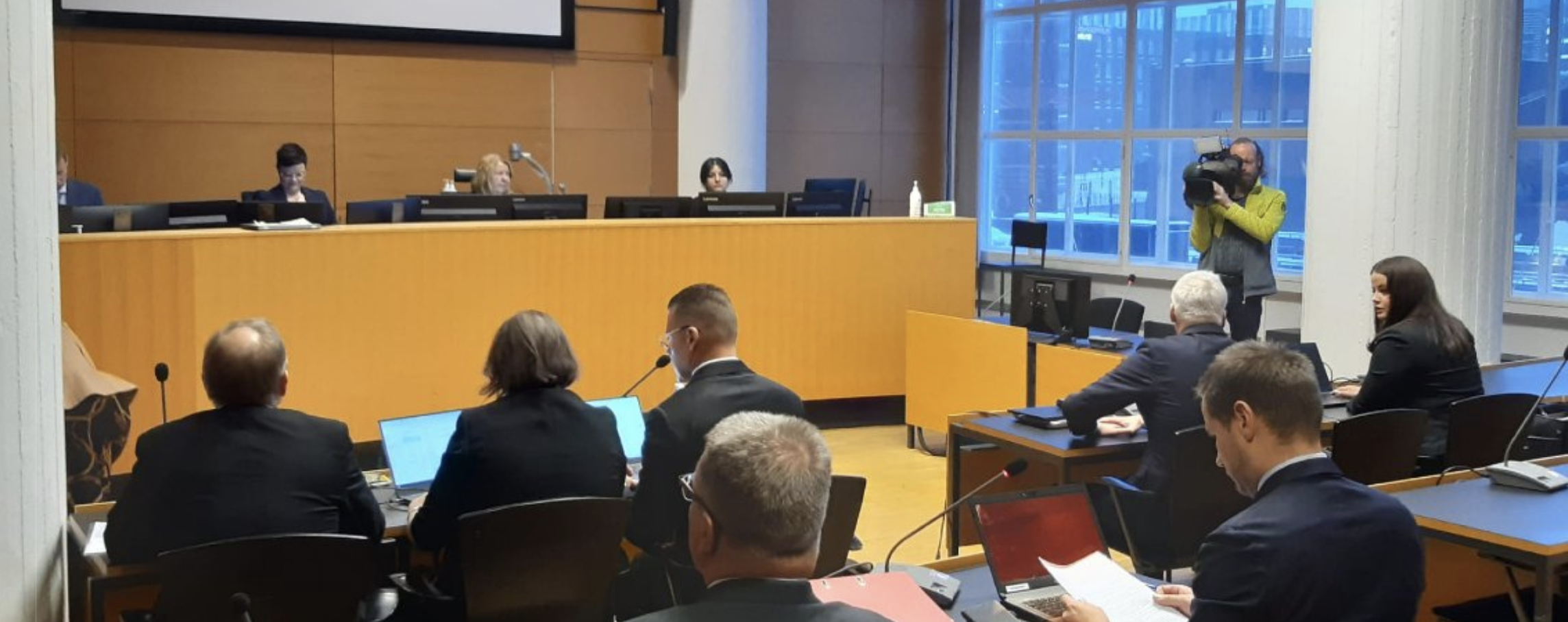Finland: Reporting on national security issues must not become a taboo, RSF warns after observing the Helsingin Sanomat trial
Photo Credits: RSF
The verdict in the trial of Finland’s largest newspaper for revealing state secrets in 2017 will be announced by the end of January 2023. Worried about the domestic and international impact of the criminal prosecution of journalists in a country ranked fifth in its World Press Freedom Index, Reporters Without Borders (RSF) monitored the proceedings in Helsinki.
“We are troubled by the prosecution of three journalists for disclosing state secrets in a Helsingin Sanomat article. The military must be subjected to public scrutiny, all the more in times of war in Europe when its role and powers are growing. Finland, which has a special responsibility due to its role of setting press freedom standards, must not send out the message that covering national security issues is a taboo.
Pavol Szalai
Head of RSF’s EU and Balkans desk
“The criminal proceedings have been worrying in several regards and have already led to self-censorship in reporting on Finland’s defence policy. The verdict, most probably subjected to appeals, will set a precedent. We will continue to follow closely the case which will determine the future of journalism in Finland and beyond.
Yrsa Grüne-Luoma
President of RSF Finland
The verdict in the first-instance trial of the Finnish journalists Tuomo Pietiläinen, Laura Halminen and Kalle Silfverberg, charged with revealing state secrets in a Helsingin Sanomat article, should be delivered by the end of January 2023. The date was announced by the presiding judge after the final statements given on 13 and 14 December. On these days, the trial with the journalists of Finland’s biggest newspaper was observed in person at the Helsinki District Court by Pavol Szalai from RSF’s Paris headquarters and by Yrsa Grüne-Luoma and Thomas Slätis from the organisation’s Finnish branch.
On 14 December, the judge also pledged that the decision would be publicly accessible. This is in stark contrast with most of the hearings, which took place behind closed doors. It was supposed to be the case also on the trial’s last day, 16 December. The journalists’ attorney went as far as to call the trial “the most secret in Finland”. But the lack of transparency has been only one of the troubling features of the proceedings which have already produced, according to RSF’s information, a chilling effect on Finnish reporters covering national security issues.
The trial has been marked by several surprising turns by the prosecution. The latest one took place on 13 December when the prosecutor suggested that Helsingin Sanomat’s Editor-in-Chief at the time, Kaius Niemi, is again a suspect in the case. He was initially investigated as a suspect together with the Executive Editor, Esa Mäkinen, after the Defence Forces filed the complaint in December 2017. However, the charges were eventually brought only against the authors of the article, Tuomo Pietiläinen and Laura Halminen, and against the newspaper’s political editor, Kalle Silfverberg. On 16 December 2022, the prosecutor finally announced no new charges would be pressed.
As pointed out by the legal defence in their closing statements, the prosecution of journalists who are not responsible for the decisions to publish as opposed to the editor-in-chief, fails to reflect the editorial practice in the media. In this context, the prosecutor raised – surprisingly only after the start of the trial this autumn – new charges against the three journalists: “helping” to reveal state secrets. They were added to the charge of revealing state secrets and to the unprecedented charge of “intention” to reveal state secrets.
The prosecutor indeed insisted in her closing statement that the journalists were planning further publications, while being aware of the confidential nature of the information. They threatened national security, according to the indictment, regardless of whether the information - deemed by the prosecutor as confidential - was published in the newspaper or not.
The legal defence argued that the article on a military intelligence centre was published in public interest because at the time, amendments giving more powers to surveillance agencies were discussed. Furthermore, according to the journalists’ attorneys, the article contained publicly accessible information; a claim considered by the prosecutor as a mere legal strategy. But in their closing statements, the journalists’ lawyers also underlined that the notion of “state secret” was neither defined by the law, nor explained during the trial. Moreover, they argued, the military intelligence centre was closed down in 2014.
While the defence requests the acquittal of the journalists, the prosecutor seeks an 18-month suspended prison sentence. Regardless of the verdict, at least one of the sides is expected to appeal which will result in proceedings continuing in the coming years.
Hence, the Helsingin Sanomat proceedings will continue creating pressure on the Finnish journalists, already struggling with the country’s traditional culture of secrecy around the military whose role has further grown in the context of Russia’s attack on Ukraine and Finland's accession to NATO. Moreover, concerns about insufficient protection of journalistic sources, which was partially breached during the prosecution of the Helsingin Sanomat reporters, remain.
Finland is ranked 5th out of 180 countries in RSF’s 2022 World Press Freedom Index.
Source: RSF

